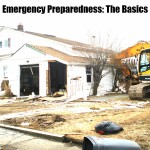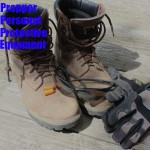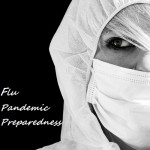Wilderness Survival: Essential Medications
Preparedness is an essential component of being an outdoorsman or outdoorswoman and being proactive in any situation is always better than just simply being reactive. Being in the great outdoors allows us to enjoy all the beauty and the natural high that nature offers, however this also brings inherent hazards that all of us have to be aware of. Preparedness is an essential part of ensuring that an otherwise enjoyable hike or daytrip does not boil down into a catastrophe. In this article we shall talk about the necessity of having an adequate medical kit in your backpack. Now most of the medications you will need when venturing outdoors will usually come in blister packs. These packs definitely save space, but when used have the potential to become undesired waste material. For any medicine you purchase, it would be better to have it transferred to small zip-lock bags or pill boxes properly labeled with the medication name and expiry date. You can also vacuum pack your pills to prevent moisture from reaching it. Dessicants are also a good way from preventing moisture reacting to your pills. Again, I will have to emphasize that you label your medical kit with the proper name and expiry date of the medication. Take note of the pill appearance as well, as the extreme temperatures of the wilderness may hasten the deterioration of your medications. You might have to rotate your pills every month or so, even if it is still within the usable shelf life.
To begin with, there are no hard and fast rules as to what medications you should be bringing to the wilderness. Of course you have the basics, but you may also need to add medications for your own needs or the particular area where you are going. Here are some basic medications you will need in your pack:
Personal Medications
If you have any maintenance medications then this is an indispensable and necessary part of your pack. Conditions like asthma, thyroid conditions, diabetes, hypertension, etc., may require daily medications, so never fail to forget these. For diabetes, you will also need to pack a glucometer and extra strips if ever you might need to measure blood glucose. Also, if you have any companions during your trip, pay attention to their own medication needs or remind them to bring their own pills. Take note that you should be bringing your medications even during day trips as any untoward events might force you to spend a night in the woods. In fact, you should have at least an extra 3 day emergency pack in your medication kit. We don’t want to sound paranoid, but the wilderness doesn’t run on your schedule, so it pays to be safe rather than sorry.
Allergy Medications
Allergy in any form is a frequently overlooked medical condition. Most people think that allergies are nothing more than just a bunch of itchy rashes all over the body. However, what most people don’t realize that all allergies have the potential to escalate into something catastrophic called anaphylaxis, which may lead to anaphylactic shock. This leads to the blocking off of the airway preventing breathing and the fall of blood pressure. If not medically treated right away, anaphylaxis is guaranteed to be fatal. Now hospital personnel use specific medications for allergies, most hospitals carry a drug called “EpiPen”, which is epinephrine. This is the ideal management for most severe allergies. Some people who have frequent allergies carry this with them for emergencies. The EpiPen is best administered though by people who have medical training. For your pack, we suggest bringing along medications called “antihistamines”. These are oral medications such as Diphenhydramine (Benadryl), Cetirizine, or Loratadine that help to alleviate the symptoms of allergies. Be aware that most antihistamine medications may cause drowsiness. Calamine lotion is also a good idea for your pack, to alleviate skin allergies due to insect bites or poison ivy.
Pain medication
Pain relievers such as Ibuprofen or Mefenamic acid are also essentials that need to be included in your medication kit. As the name suggests they help to relieve pain for a variety of painful conditions.
Acetaminophen/Paracetamol – Can serves as weak pain reliever or a pill to give for people experiencing fever.
Aspirin – Although a weaker pain reliever, Aspirin is still an essential medication to pack. Avoid giving this to children though or people with bleeding conditions. Aspirin is also an essential first aid medication to give for people who are suspected of having chest pains due to a heart attack. It is effective in preventing mortality in about 25% of people who are experiencing a heart attack.
Laxatives
Laxatives in its pill form might be an unusual medication to bring, but being in the wilderness for a long period of time with limited access to water, leads to partial dehydration and might cause constipation. Bear in mind to use this only when necessary as it may have the opposite effect of causing diarrhea, which will lead to further dehydration.
Anti-Diarrheals
Anti diarrheal medication acts opposite to what laxatives do. Experiencing diarrhea in the wilderness is not exactly a pleasant thing to endure and may consequently lead to dehydration. No stopping diarrhea is not exactly the best way to manage gastrointestinal infections, but dehydration and the lack of adequate water in the wilderness is as serious conditions. Always use anti-diarrheal medications judiciously and only for severe and frequent diarrhea that quickly leads to dehydration. It is important to seek immediate medical consult for gastrointestinal infections such as Giardiasis or Amoebiasis.
Alex Estra, MD is a doctor of Podiatric Medicine. He has an avid interest in survival/wilderness preparedness and regular contributor to Dan’s Depot.
Affiliate Disclosure: I am grateful to be of service and bring you content free of charge. In order to do this, please note that when you click links and purchase items, in most (not all) cases I will receive a referral commission. Your support in purchasing through these links enables me to keep the content train rolling






I never thought of taking anti diarrhea medication or even laxatives. I know that this is not soothing we like to talk about but it is essential. Thanks for this great article.
Thanks for your article! Medical preparedness is one of my passions, and we definitely need to get the word out to more people!
Have you ever heard of the concept of using therapeutic-grade essential oils for medical preparedness? I wrote an article on how to use just 2 essential oils for upwards of 50 different medical needs, including allergies, diarrhea, pain, wounds, anxiety and more. I would love your feedback on it! http://essentialsurvival.org/fast-track-survival-medicines/
As someone that had part of their intestines removed I always carry anti diarrhea meds with me (OTC). I just imagine how devastating a day or two of diarrhea would be in the wild. Losing so much fluid and having any food you can eat go right through you could be deadly.